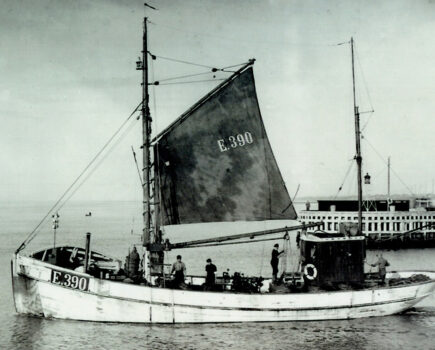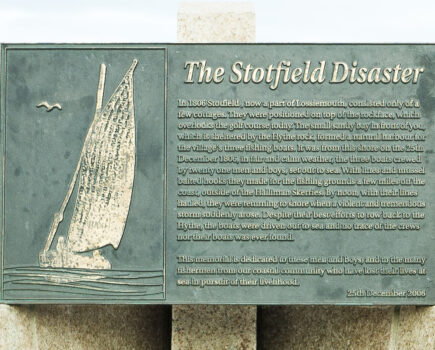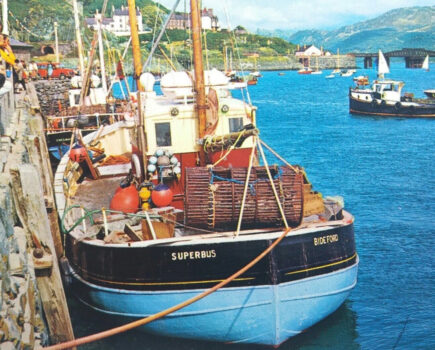A young Sussex fisherman is looking to the future with his newly refitted Delta Star, reports John Periam. Photos: Geoff Lee
Steve Eason is a 35-year-old fisherman who fishes out of Brighton Marina and sometimes out of Shoreham. He has recently finished refitting his own fishing boat with the help of local boatbuilder Max Munck.
In the current economic climate, this is a rare and welcome occurrence. Paul Johnson, principal marine officer for the Marine Management Organisation (MMO) South East team, said: “It’s been great to see this project take shape over the months. Both Steve and Max have worked very hard on the detail, and have produced an excellent working platform for Steve. He has made a significant investment in the industry, with the assistance of a European Maritime and Fisheries Fund (EMFF) grant, which was provided by the MMO. I feel confident that his business will thrive in the future, and the hard work he has put in will be worthwhile.”
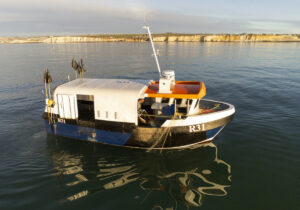
Steve Eason’s recently refitted Delta Star R 31.
Steve said: “I loved boats from a very young age – which at times drove my mother to the point of despair – making fishing boats out of cereal boxes or old lumps of wood in the back garden. Brighton Marina was down the road, so given any opportunity I used to go there, just to meet and mix with the fishermen. My dad had his own boat, named Come Quickly R 2, which was an Island Plastics IP23. He bought her in the early ’90s, I think from Broadstairs.
“They were some of the happiest times of my life, and I used to bunk off from school and go with some old fishing family friends – Ted and Andrew on their Kingfisher K26 Full Circle SM 789, and John on his boat Aquarius FY 74. Another Brighton fisherman, Chris Leach, helped me out loads, and used to take me out to sea – I think I was about 15 then. He was one of my mentors and taught me a lot, along with another fisherman, Alan Hayes.
“Meanwhile, my dad encouraged me to continue, and I bought his boat Come Quickly off him – I had at last become a boat owner.
“I continued using this boat, and in 2006 I bought Speedwell F 11, changing her name to Libby Lou SM 11. That was a Napier Aquastar 29, which I got from Padstow. Alan Hayes, who has always been about for as long as I can remember, couldn’t wait to give me a hand with sorting bits out on Libby Lou. Alan loves messing about with boats; he always makes them look nice. Peter Leach and Bill Brock of Brighton and Newhaven Fish Sales helped me out with getting a licence sorted – thank you to both.”
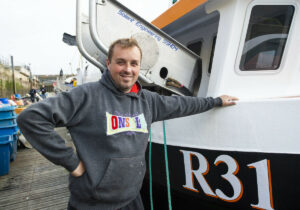
Skipper/owner of the Delta Star R 31 Steve Eason.
Dave Sutton, who owns Sutton Workboats, based at Newhaven, has been a friend of Steve’s for a long time. He guided him in the right direction with some design changes to Libby Lou, including building a new wheelhouse from one of Dave’s moulds, moving it forward, and reglassing the deck at the same time.
“Libby Lou was a fantastic sea boat for her size, and I often worked alongside Chris Leach, who also owned a Napier Aquastar 29, Last Chance SM 701, when we were bass drifting in some horrible weather. We had some brilliant nights, but some terrible headaches too, with gear spinning up, then getting nets around the prop – all part of a fisherman’s life.”
Time for a change
Steve had always wanted a vessel with a bit more room and a flush deck, and had always liked the Delta Star 33, which offers more space and is ideal for single-handed fishermen. He had heard from his friend at Ramsgate, Graham Pulman, that John Pocock’s Delta Star was coming up for sale, as he was in the throes of building a new catamaran.
“A phone call, and before we knew it, my wife Becky and I were at Ramsgate looking at her. She’d had a very hard life, but was a lovely boat. It was one of those instant decisions, and the deal was made. I have made some good friends over the years, and I owe them a debt of gratitude for their advice and support during this time.”
Steve contacted local boatbuilder Max Munck, who told Fishing News: “I have worked locally helping many fishermen with their boats. This could involve anything from a complete rebuild to repairs – it is a close-knit community here, so it doesn’t take long for one to get known.
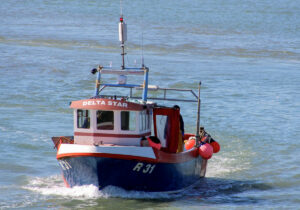
The Delta Star R 31 before its rebuild. (Photo: Steve Eason)
“I now work for myself, following an apprenticeship at Orkney Boats and Northshore Yachts, where I was involved in the mould side of building. This has been helpful to me in my current role. My father had a fishing boat, and from a young age I have always been interested in boat design and repairs, and one thing led to another. I have been involved in traditional wooden boatbuilding also, working on several of the Hastings beach boats. I have now moved into fibreglass work, and this can include anything from hulls to deck hatches, etc. I even do some engineering and upholstery, and love fresh challenges.”
Max did the bulk of the work on Steve’s new boat, and Steve helped him out whenever he could. Between them, they mapped out a plan of action, and decided that the best route to take was a complete refit. Paul Johnson from the MMO went out of his way to support them. Max said: “Paul is one of the old school with a fishing background. He knows the local fishermen whilst having a working knowledge of the area, which I personally have always respected – we are lucky having Paul in his official MMO role here.”
First of all, they stripped the boat back to the bare 30ft hull – which had been built in 1999 – and even cut the whaleback off and raised it 10in to make room for a bunk. This was followed by new GRP deck beams, a Nidaplast deck, bulkheads, a 1,150-litre Tek tank, a new steering ram, and a new wheelhouse, which Max made and designed. The EMFF funding helped with the costs for the windows, shelter deck, stacker and deck lighting.
Everything in the boat is plastic – there is no wood – and once it was all done, Max rubbed the boat down and painted her. He says that it worked out cheaper to buy the old hull and do this work, rather than purchase a new hull. It did involve a lot of work, but was well worth it.
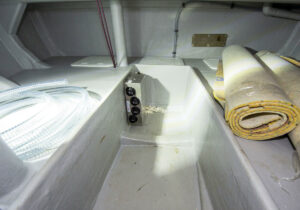
The large storage area under the wheelhouse will also accommodate a single berth.
Dave Sutton of Sutton Workboats supplied all the materials for the glass work including the shelter deck, the hydraulics and the deck lights and windows. Steve says that he cannot thank Dave enough for his continued support over the years.
Dave Sutton said of Steve: “I have watched him work over many years. He loves his fishing, and at times it has not been easy for him to get where he is now. He is dedicated to what he does, and the effort he has put into getting the Delta Star into the water is amazing. It is people like Steve who help our fishing industry survive.”
Once the structure of the boat was completed, it was time to fit her out.
The Delta Star R 31 is powered by a six-cylinder Cummins 160hp marine diesel engine and has a 24in by 20in four-bladed propeller, giving it a cruising speed of 7.5 knots at 1,500rpm. It has a 24V DC 3kW 70kgf Vetus bow thruster.
The deck area is flat and spacious for Steve’s large net bins, and is totally sheltered, making it easy to go about the daily work in all weather conditions.
His new purpose-built wheelhouse is large, with a single berth in the fore cabin, as well as a large storage area under the wheelhouse. Onboard communications, recording and navigation equipment consists of:
- Furuno 10.4 LCD radar model 1835
- Furuno GP39 GPS navigator
- ICOM VHF/DSC IC-M411 and ICOM VHF/DSC IC-M423 radios
- Raymarine Evolution autopilot system
- Two Neovo screens with MaxSea TZ3D sounder plotter software
All electronics were supplied by PT Marine.
At sea with the Delta Star
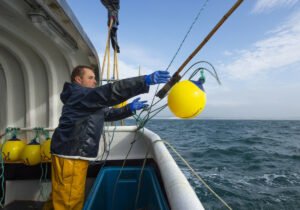
Reshooting the gear – as one string ends, Steve throws the next set in.
It was a 6.30am start for Fishing News, and as the Delta Star left Brighton Marina, the forecast was for a southeasterly wind at 9-17mph, with temperatures rising to 12° and 100% cloud cover. The boat headed southeast out of the marina, running along the coast to Newhaven, with the Seven Sisters cliffs always in sight.
Steve said: “My nets start with the dhan (marker buoy) with a black flag, three fathoms of rope to the yellow buff A0 buoy, 30 fathoms of rope to the spade anchor, then 10 fathoms of rope joined to 100 yards of net, made up of five individual ones. The net is 8½in trammel, 6mm blue top-line with white floats every 10 stops and no. 3 leadline, all supplied by Gillam Rigging and Supplies – and then the reverse set-up the other side.”
After about 40 minutes and five miles off the coast, Steve located his first dhan marker, indicating the first of six nets to haul in today, which had been shot two days earlier. He was using a Solent Engineering SSH04 net hauler located on the starboard foredeck to bring in the nets. He then removed the catch and placed it into containers.
After a couple of hauls, he used his ceiling-mounted John Leach net stacker to separate the strings, which operated off the gearbox via the Spencer Carter clutch pump. The nets were shot while steaming down the tide and fished along the direction of the tidal stream, rather than across it, as this reduces the chances of the nets being swept over or tangled in the strong tidal conditions. The dhan is then thrown back overboard, and the vessel steams away from it, paying out the rope until it reaches the anchor, which is quickly dropped overboard. The fleet of nets follows until the full length of netting has run out, before the second anchor and dhan follow.
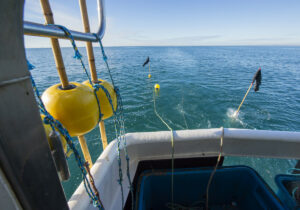
Black flags and marker buoys indicate the new location of the nets.
Once this was completed, Steve started to gut, clean and box his catch, which today consisted of brown crab, brill, turbot, blond rays and thornback rays, before returning to Brighton Marina. When the boat was tied up, the boxed catch was lifted ashore, and then collected by the processing house for weighing.
Due to the dull and grey conditions, Steve invited Fishing News to join him on a second trip, and this time the weather was a sunny 2°, with a southeasterly wind at 2-3mph, allowing additional photographs to be taken.
Looking to the future
Steve plans to continue fishing out of Brighton Marina and sometimes out of Shoreham. There is still ongoing work needed on the Delta Star, and Steve will continue doing this with funds raised from his fishing. “I will go on working on my own. My son Harry enjoys going to sea with me, so hopefully he may follow in my footsteps, but I will not pressure him into it. It has to be his own decision! I do enjoy what I do, and have the support of my family. I am so pleased with the Delta Star and the way she handles, and the effort Max has put into building her is one of the key factors. It is a quality-build vessel, and it shows.”
Steve is also dedicated to protecting our seas. “I fully endorse what Ben Dunwell from Newhaven is doing (Fishing News, 3 October, ‘From trawler to Mermaid fish shop’), and like him, I bring back to shore any items I see in my nets and floating on the water’s surface. More fishermen should start doing this, and it is nice to see many of my colleagues from Brighton doing the same. The beaches along this neck of the woods get very crowded, and litter gets washed into the sea. I have never been able to understand why people cannot be bothered to remove their own rubbish from the beach when they leave it. A sign of the times, perhaps.”
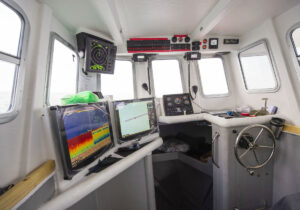
The wheelhouse is well laid out, with new communications, navigation and plotting equipment and excellent all-round visibility.
Steve is very positive about the future. “I think the MMO is making a concerted effort to work with the fishermen more, and that relationship is getting stronger. The biggest problem facing the local inshore fishing community is Sussex Inshore Fisheries and Conservation Authority (IFCA). I had a great deal of respect for them, but lately they seem to be dreaming up silly rules which could have an adverse effect on our inshore fishing, and which could stop it altogether.
“There have been times recently when they have stopped fishermen for the sake of it, when there were no issues at all. These new rules and regulations are not helping. Added to this we have wind farm development and MCZ fishing. All the IFCA is doing is causing us a lot more soul-searching. I have tried hard to keep to the regulations and have fished sustainably all my life, having been guided by some of the best.
“I do worry about safety at sea, especially as I often fish single-handed. One second’s lack of concentration can lead to an incident that can have a disastrous outcome. I make sure my safety gear is checked regularly, and when I go to sea, all parties are contacted, giving my movements for the day. My family need to see me return home, and cutting costs in safety is not a wise move.
“The MMO and the grants team are helping people like myself, making our working life a lot safer by modernising boats. They share our concerns. But there are too many separate bodies out there, who at times work against each other – not intentionally.
“I do hope the current Brexit issues can be resolved, and the UK fishing industry will revert to the way it used to be. We need stronger fishing communities, where families can encourage their sons to carry on the traditions of sustainable fishing that their grandfathers and father grew up with.
“I love what I do, and having the Delta Star is my way of saying to the industry that I do have faith in my future, and hopefully my son’s future. We will see!”
Gear from Gillam
“Steve is one of that rare breed of fishermen who is respected by many and goes out of his way to help others,” said Andrew Gillam of Gillam Rigging and Supplies, who has supplied Steve with most of his fishing gear, including nets, ropes and lead lines.
“My son Tom has joined my company to keep up the family name, and has helped Steve with his rigging. We supply about 50 vessels along the coast from Peacehaven, and have been involved in rigging for over 30 years. We come from one of the oldest fishing families in Sussex, almost going back to Domesday,” said Andrew with a smile.
“Steve is one of the best; he is a grafter. He built his fishing business up from scratch to where it is now, and supports his wife Becky and three children, Evie, Harry and Libby – a dedicated family man. I remember taking him to sea when he was young, and we could not keep him away from it. I treat him as a son, and we would do anything for him. Many would have given up with the current state of the fishing industry – but not Steve. He has worked hard to get the Delta Star ready – she is a nice-looking boat!”




